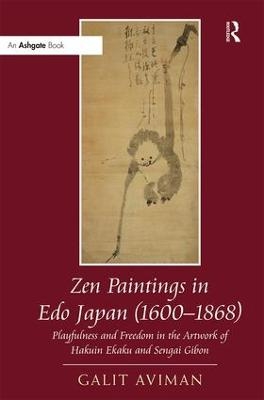
Zen Paintings in Edo Japan (1600-1868)
Playfulness and Freedom in the Artwork of Hakuin Ekaku and Sengai Gibon
Seiten
2014
Routledge (Verlag)
978-1-4094-7042-7 (ISBN)
Routledge (Verlag)
978-1-4094-7042-7 (ISBN)
- Titel z.Zt. nicht lieferbar
- Versandkostenfrei
- Auch auf Rechnung
- Artikel merken
This book explores the playfulness and free-spirited attitude reflected in the artwork of two prominent Japanese Zen monk-painters: Hakuin Ekaku (1685-1768) and Sengai Gibon (1750-1837). Aviman elaborates on the nature of this particular artistic expression and identifies its sources, focusing on the lives of the monk-painters and their artwork.
In Zen Buddhism, the concept of freedom is of profound importance. And yet, until now there has been no in-depth study of the manifestation of this liberated attitude in the lives and artwork of Edo period Zen monk-painters. This book explores the playfulness and free-spirited attitude reflected in the artwork of two prominent Japanese Zen monk-painters: Hakuin Ekaku (1685-1768) and Sengai Gibon (1750-1837). The free attitude emanating from their paintings is one of the qualities which distinguish Edo period Zen paintings from those of earlier periods. These paintings are part of a Zen ink painting tradition that began following the importation of Zen Buddhism from China at the beginning of the Kamakura period (1185-1333). In this study, Aviman elaborates on the nature of this particular artistic expression and identifies its sources, focusing on the lives of the monk-painters and their artwork. The author applies a multifaceted approach, combining a holistic analysis of the paintings, i.e. as interrelated combination of text and image, with a contextualization of the works within the specific historical, art historical, cultural, social and political environments in which they were created.
In Zen Buddhism, the concept of freedom is of profound importance. And yet, until now there has been no in-depth study of the manifestation of this liberated attitude in the lives and artwork of Edo period Zen monk-painters. This book explores the playfulness and free-spirited attitude reflected in the artwork of two prominent Japanese Zen monk-painters: Hakuin Ekaku (1685-1768) and Sengai Gibon (1750-1837). The free attitude emanating from their paintings is one of the qualities which distinguish Edo period Zen paintings from those of earlier periods. These paintings are part of a Zen ink painting tradition that began following the importation of Zen Buddhism from China at the beginning of the Kamakura period (1185-1333). In this study, Aviman elaborates on the nature of this particular artistic expression and identifies its sources, focusing on the lives of the monk-painters and their artwork. The author applies a multifaceted approach, combining a holistic analysis of the paintings, i.e. as interrelated combination of text and image, with a contextualization of the works within the specific historical, art historical, cultural, social and political environments in which they were created.
Galit Aviman received her PhD at Ben-Gurion University of the Negev, Israel in cooperation with Kyoto University, Japan. She conducted her post-doctoral studies at the Edwin O. Reischauer Institute of Japanese Studies, Harvard University, USA. She lived in Japan for ten years in total. Currently she is a lecturer at Ben-Gurion University of the Negev, The Hebrew University and Tel-Aviv University.
Contents: Introduction: playing with words and images; Evolution towards Zen paintings in the Edo period; An independent artistic language; Liberation from rules; Letting go of common conceptions; Emancipation from social conventions; Humor as an expression of freedom; Conclusion: ultimate freedom; Bibliography; Index.
| Erscheint lt. Verlag | 10.12.2014 |
|---|---|
| Verlagsort | London |
| Sprache | englisch |
| Maße | 156 x 234 mm |
| Gewicht | 540 g |
| Themenwelt | Kunst / Musik / Theater ► Kunstgeschichte / Kunststile |
| Geisteswissenschaften ► Geschichte ► Regional- / Ländergeschichte | |
| Geisteswissenschaften ► Religion / Theologie ► Buddhismus | |
| ISBN-10 | 1-4094-7042-3 / 1409470423 |
| ISBN-13 | 978-1-4094-7042-7 / 9781409470427 |
| Zustand | Neuware |
| Haben Sie eine Frage zum Produkt? |
Mehr entdecken
aus dem Bereich
aus dem Bereich
Erinnerungen
Buch | Softcover (2024)
Pantheon (Verlag)
CHF 22,40


